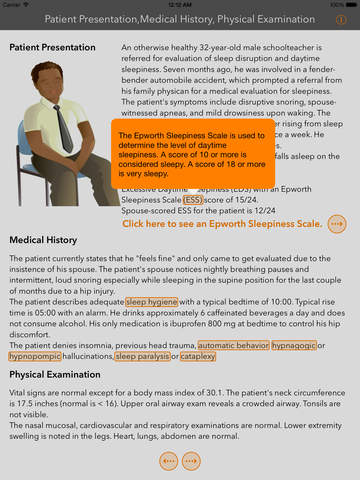MySleep101 App Addresses Sleep Disorders Associated With PH, Other Conditions
Written by |
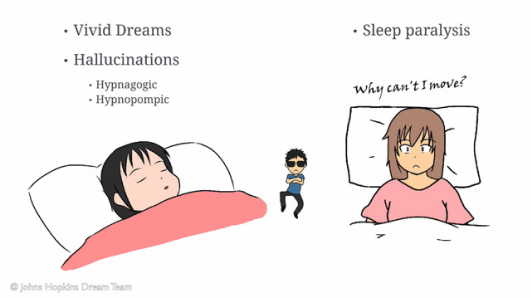
Affecting more than 80 million Americans each year, poor sleep quality has been associated with increased risks of stroke, dementia, headaches and several cardiovascular issues, including atrial fibrillation, and heart failure. Sleep disorders are also believed to be a factor contributing to pulmonary hypertension. Despite increasing numbers of people diagnosed with the disease worldwide, pulmonary hypertension has been a historically neglected disease that occurs when there is increased pressure in the blood vessels of the lung, thereby compromising delivery of blood and oxygen to the body. Symptoms are debilitating and initially include shortness of breath and fatigue, but if left untreated, PH can lead to right ventricular failure, volume overload, and death. The molecular processes by which diverse upstream stimuli result in PH remain enigmatic. However, researchers recognize that poor sleep quality has obvious associations with fatigue,
Short-term effects of disrupted sleep include reduced memory function, trouble with concentration, mood swings, decreased productivity, and reduced sexual drive and performance. Microsleep — temporary sleep episodes that may only last for a second or two — is also a concern. However, only a small minority of sleep disorder patients — both in the PH patient population and elsewhere — are being accurately diagnosed and receiving the care they need, even if they consult with their primary care physician or other doctors. Because of a national sleep medicine expert shortage, sleep disorders are commonly left untreated in America and elsewhere.
Board-certified sleep physicians at the Johns Hopkins Hospital in Baltimore, Maryland, working in collaboration with an interdisciplinary team of sleep and medical software design experts, have developed a mobile device app for Apple iPhones and iPads designed to help educate care providers on how to screen and counsel patients for the most common sleep disorders in order to help them get a better night’s sleep by providing health care staff members with a basic educational tool on their smartphones or tablets.
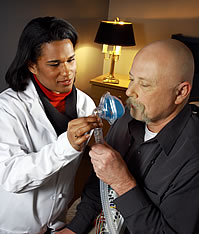 The Johns Hopkins Hospital Sleep Disorders Center is comprised of an interdisciplinary team of health care providers including pulmonologists, neurologists, psychologists, anesthesiologists and otolaryngologists, who are all board-certified in their own specialty and most of whom are board certified or board-eligible in sleep medicine, and the Center is fully accredited by the American Academy of Sleep Medicine.
The Johns Hopkins Hospital Sleep Disorders Center is comprised of an interdisciplinary team of health care providers including pulmonologists, neurologists, psychologists, anesthesiologists and otolaryngologists, who are all board-certified in their own specialty and most of whom are board certified or board-eligible in sleep medicine, and the Center is fully accredited by the American Academy of Sleep Medicine.
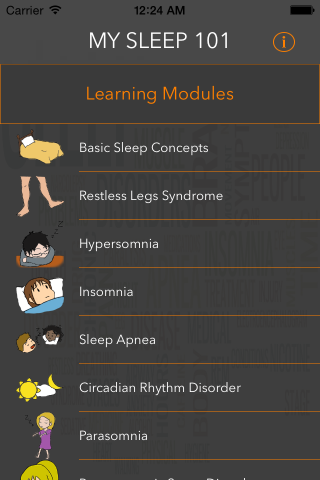 The iOS app, called MySleep101, is a mobile learning application offering clinicians who are not sleep disorder experts with information on how to screen and counsel patients experiencing sleepless nights. Doctors, nurses, and other care providers can access basic information about the seven most common disorders associated with poor sleep quality: restless legs syndrome, hypersomnia, insomnia, sleep apnea, circadian rhythm disorders, parasomnia and post-traumatic stress disorder.
The iOS app, called MySleep101, is a mobile learning application offering clinicians who are not sleep disorder experts with information on how to screen and counsel patients experiencing sleepless nights. Doctors, nurses, and other care providers can access basic information about the seven most common disorders associated with poor sleep quality: restless legs syndrome, hypersomnia, insomnia, sleep apnea, circadian rhythm disorders, parasomnia and post-traumatic stress disorder.
Johns Hopkins neurologists and board-certified sleep physicians Charlene Gamaldo, M.D., and Rachel Salas, M.D., developed the app cooperatively with an interdisciplinary team that included experts in graphic design, animation, software development and behavioral sleep medicine, with the goal of providing critically relevant information in an easily accessible format designed to be appealing to providers who are inclined to use their cellphones and tablets as medical tools. The key concepts related to basic sleep physiology and common sleep disorders are presented by the experts in brief and high yield mini module formats. The app, which requires iOS 7.1 or later, and is compatible with iPhone, iPad, and iPod touch, and optimized for iPhone 5, iPhone 6, and iPhone 6 Plus, also provides opportunity for the health care provider learner to gain a better understanding of sleep issues and disorders that they will likely encounter in their patients.
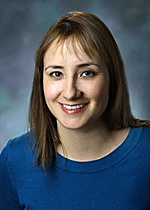 Dr. Salas is specialist in sleep disorders who conducts clinical research on neurophysiological changes resulting from sleep disorders. Her primary area of research interest involves exploring the underlying mechanisms of sleep and chronic sleep disorders such as insomnia and Restless Legs Syndrome (RLS). More specifically, Dr. Salas’s long-term objective is to better understand changes in cortical activity associated with insomnia and RLS, in order to improve treatment for these conditions.
Dr. Salas is specialist in sleep disorders who conducts clinical research on neurophysiological changes resulting from sleep disorders. Her primary area of research interest involves exploring the underlying mechanisms of sleep and chronic sleep disorders such as insomnia and Restless Legs Syndrome (RLS). More specifically, Dr. Salas’s long-term objective is to better understand changes in cortical activity associated with insomnia and RLS, in order to improve treatment for these conditions.
 “Not everyone has the time or interest to get certified in sleep medicine,” notes Dr. Gamaldo, medical director of the Johns Hopkins Center for Sleep and a member of the American Academy of Neurology, the American Academy of Sleep Medicine and the World Association of Sleep Medicine, in a release. “Nonetheless, this app can serve as a novel tool that allows all providers to supply important sleep information to patients in a way that is conducive to their work and learning preferences.”
“Not everyone has the time or interest to get certified in sleep medicine,” notes Dr. Gamaldo, medical director of the Johns Hopkins Center for Sleep and a member of the American Academy of Neurology, the American Academy of Sleep Medicine and the World Association of Sleep Medicine, in a release. “Nonetheless, this app can serve as a novel tool that allows all providers to supply important sleep information to patients in a way that is conducive to their work and learning preferences.”
Dr. Gamaldo’s research interests in the area of sleep medicine include investigating the comorbid health consequences of chronic sleep deprivation, one of which would be pulmonary hypertension (PH).
[adrotate group=”4″]
My sleep 101 is an engaging and animated educational experience that was composed by an interdisciplinary team of sleep experts at The Johns Hopkins University School of Medicine. This app also allows an opportunity for the health care provider learner to gain a better understanding of sleep issues and disorders that they will likely encounter in their patients.
The educational tool consists of short video clips that educate health care providers and consumers on the basic concepts of sleep and findings from recent scientific research. The lectures, which use the real voices of Drs. Gamaldo and Salas, are delivered by avatars of the two doctors.

Animated characters are employed to communicate essential clinical features, symptoms and risk factors associated with specific sleep disorders, and describe treatment and management strategies for physicians to recommend to patients. However, the developers caution that the app is intended as an educational — not a diagnostic — tool, and stress that when suspected sleep disorders are identified, physicians should refer patients to board-certified sleep specialists.
[adrotate group=”3″]
“If you’re hungry or thirsty, your body emits signals to alert you to the problem, though it cannot make you eat,” says Dr. Salas. “But if you are tired, your body can force you to sleep, no matter what you are doing. This can present a huge problem for individuals who are behind the wheel of a motor vehicle or who are involved in delicate procedures.”
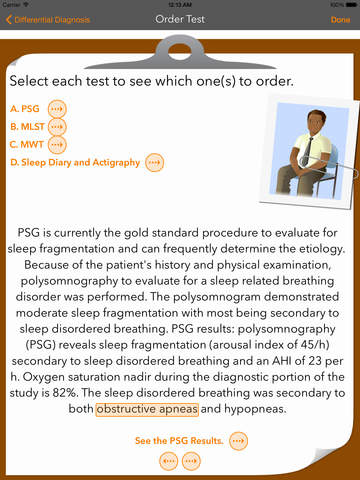 The My sleep 101 mobile app describes recommended sleep practices that can improve patients’ health outcomes. Such interventions include putting a standard sleep schedule into practice and turning off electronic devices in the hours prior to bed, in an effort to decrease melatonin triggers due to light emanating from technology screens that are believed to be a factor in disrupted sleep.
The My sleep 101 mobile app describes recommended sleep practices that can improve patients’ health outcomes. Such interventions include putting a standard sleep schedule into practice and turning off electronic devices in the hours prior to bed, in an effort to decrease melatonin triggers due to light emanating from technology screens that are believed to be a factor in disrupted sleep.
In addition to improving the sleep and overall health of patients, Drs. Gamaldo and Salas hope their application will be embraced by their peers as a help aid to improve their own sleep habits. They cite studies suggesting that care providers who regularly follow healthy lifestyle practices, such as getting the recommended amount of sleep, are more likely to solicit and counsel their patients on these behaviors.
“We need to make sleep a priority for our patients and ourselves,” says Dr. Salas. “Our goal is to educate our colleagues that sleep is important and that it impacts our patients’ quality of life and morbidities.”
The My sleep 101 mobile application is available on the Apple App Store for iOS devices for $3.99 for individual purchase, and at a discounted bulk rate. A demo version, called MySleep101 Lite, is available for free. Both apps are distributed to the public through the Johns Hopkins Technology Ventures office
Sources:
Johns Hopkins Hospital
Apple Inc.
Image Credits:
Johns Hopkins Hospital
Apple Inc.
